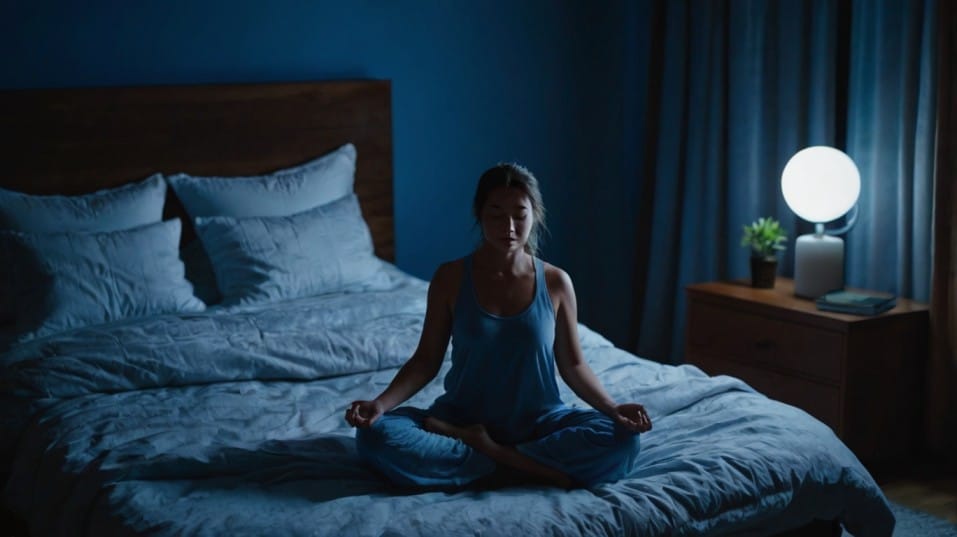The Science of Sleep Optimization Through Daily Mindfulness
Discover the science of sleep optimization through mindfulness. Learn how breathing, meditation, and routines improve sleep and well-being.

Do you ever collapse into bed, exhausted, only to find your mind racing? The harder you try to sleep, the more elusive it becomes. Stress and overstimulation keep the brain on high alert, making deep rest feel impossible.
Mindfulness offers a science-backed way to quiet mental noise, relax the body, and naturally improve sleep quality.
By training your mind to stay present, you can ease into restorative rest—without relying on sleep aids or endless tossing and turning.
The Science of Mindfulness and Sleep
Your brain isn’t designed to shut down instantly. Stress, overthinking, and irregular sleep patterns keep it stuck in overdrive, making it hard to wind down.
Mindfulness rewires the brain for rest, slowing brain waves from high-alert beta states to the calm rhythm of alpha and theta waves. This transition promotes deep relaxation and primes the body for sleep.
Practicing mindfulness regularly also reduces cortisol, the stress hormone that keeps you wired at night.
Studies show that mindfulness activates the parasympathetic nervous system, the body’s natural "off switch," helping you fall asleep faster, stay asleep longer, and wake up feeling refreshed.
Simple Mindfulness Practices to Improve Sleep
Mindfulness isn’t just a concept—it’s a practice. By incorporating simple techniques into your nightly routine, you can train your body and mind to transition smoothly into rest.
One of the most effective methods is guided sleep meditation.

Guided Sleep Meditation
A structured meditation before bed helps shift your mind from wakefulness to rest. Listening to a calming voice or soft background sounds eases mental chatter and soothes the nervous system.
Try focusing on your breath, body sensations, or a simple mantra to guide your awareness away from stress and toward relaxation.
Progressive Body Scan
Tension accumulates in the body throughout the day, often unnoticed. A body scan practice systematically releases tightness, preparing you for sleep.
Start at your toes and work your way up, bringing awareness to each body part. As you notice areas of tension, consciously relax them. Pairing this with slow, deep breaths signals to your nervous system that it’s time to power down.
Breathwork for Sleep Induction
Breathing techniques are a direct line to relaxation. Deep, controlled breathing shifts the body into a restful state.
The 4-7-8 method—inhaling for four seconds, holding for seven, and exhaling for eight—triggers a relaxation response. Diaphragmatic breathing, which involves slow belly breaths, also lowers heart rate and calms the mind.
Mindful Journaling
If a racing mind keeps you up, writing can help clear mental clutter. Jotting down worries and possible solutions before bed creates a sense of closure.
Alternatively, listing things you're grateful for helps shift focus away from stress, promoting a peaceful state of mind. A positive reflection on the day sets the stage for restful sleep.
Evening Gratitude Reflection
Tuning into gratitude before bed rewires the brain for calm and contentment.
Instead of ruminating on stressors, mentally acknowledge moments of joy or appreciation from the day. This simple habit encourages emotional balance and signals to your brain that it’s safe to relax.
Integrating Mindfulness Into Your Daily Routine
Better sleep starts long before bedtime. How you navigate your day affects how easily you unwind at night.
By incorporating mindfulness into daily moments, you create a foundation for restful sleep. One of the best places to start is with your mornings.
Start Your Day with Intention
Morning mindfulness sets the tone for the day. A few minutes of deep breathing or quiet meditation upon waking helps prevent stress from building up.
Setting an intention for the day keeps your mind anchored, reducing the mental clutter that can interfere with sleep later on.
Take Mindful Breaks
Working professionals often push through long hours without a pause, leading to mental exhaustion.
Brief mindfulness breaks—such as stepping outside, focusing on breath, or stretching—help reset your nervous system. This prevents stress from accumulating, making it easier to unwind at night.
Establish an Evening Wind-Down Routine
Your body needs cues to transition from wakefulness to rest. An hour before bed, dim the lights, turn off screens, and engage in a calming activity like reading, light stretching, or sipping herbal tea.
Creating a consistent pre-sleep ritual strengthens your body's sleep-wake cycle.
Keep a Consistent Sleep Schedule
Mindfulness isn’t just about what happens before bed—it’s also about maintaining regularity. Going to bed and waking up at the same time each day reinforces your circadian rhythms.
Avoiding late-night stimulants, like caffeine or blue light from screens, also supports better sleep patterns.
The Long-Term Impact of Mindfulness on Sleep
A well-rested brain functions better. Mindfulness-based sleep practices don’t just improve sleep quality; they enhance cognitive function, memory, and problem-solving skills.
Consistent mindfulness reduces emotional reactivity, lowers stress levels, and fosters a positive mindset. Physically, deeper sleep strengthens immune function, promotes cellular repair, and reduces inflammation.
Final Thoughts: Start Tonight
Better sleep doesn’t require drastic changes—just a few mindful shifts. Whether it’s a five-minute breathing exercise, a guided meditation, or a simple gratitude reflection, the key is consistency.
Start tonight. Choose one practice, commit to it, and notice the difference. A calm mind and a rested body are within reach.




